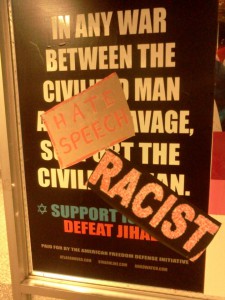The Supreme Court To Examine Freedom of Speech in Boston’s Train Stations
In the upcoming case American Freedom Defense Initiative (AFDI) v. Massachusetts Bay Transportation Authority (MBTA), the Supreme Court will decide whether or not the MBTA has set proper restrictions on advertising in public transit stations. It will decide whether or not the MBTA is a public forum, and whether or not the MBTA curbed freedom of speech by engaging in unconstitutional viewpoint-based discrimination in disallowing certain advertising.
The Facts of the Case
Three years ago, the Massachusetts Bay Transportation Authority (MBTA) began capitalizing on the ability to accept advertisers in the transit system. The MBTA has always had some ground rules about the advertisements. For example, they must not demean or disparage individuals or groups.
MBTA accepted an advertisement from the Committee for Peace in Israel and Palestine which showed the Palestinian loss of land from 1946 to 2010 and claimed that 4.7 million Palestinians are refugees. The ad was taken down after several complaints, but then the MBTA released a decision to put it back up. Around the time the pro-Palestinian advertisement returned, the American Freedom Defense Initative (AFDI) asked that its own ad be published at 10 public transit stations. The advertisement read: “IN ANY WAR BETWEEN THE CIVILIZED MAN AND THE SAVAGE, SUPPORT THE CIVILIZED MAN. SUPPORT ISRAEL DEFEAT JIHAD” 
The MBTA rejected the ad because it broke the restriction against disparaging individuals or groups. AFDI changed the ad: “savages” was reworded to “those engaged in savage acts” and “jihad” to “violent jihad.” The ad also now said “defeat jihad support Israel.” With that change in tone, the MBTA accepted the second advertisement. Then, the AFDI pulled back the approved ad in favor of a third that again contained the word “savages.” This third advertisement was rejected. The AFDI sued, claiming that the MBTA violated their free speech rights.
What are Public Forums?
There are two main types of public forums. A “traditional” public forum, like a public park or sidewalk, is a place that has always been used to carry out speech activities. The government cannot totally restrict speech in traditional public forums. In “designated” public forums, the government intentionally creates an additional place where freedom of speech can exist. However, because the government creates the designated forum, it can further regulate speech there. In all public forums, the government is very, very limited in its ability to restrict the content of speech.
In this case, the MBTA likely did not create a “designated” public forum. The MBTA clearly states in its advertising rules that it does not intend to create a public forum. The MBTA has also always had a number of ground rules about advertisements. The AFDI may have a difficult time trying to show that the MBTA intentionally created a public “anything goes” forum for speech, especially after complying with the set of regulations that the MBTA created.
Is the Restriction on “Demeaning and Disparaging” Advertising Unconstitutional?
Even if there is no public forum, the government cannot easily restrict freedom of speech based on the viewpoint of the speaker. It has much more leeway to restrict the manner of speech. For example, even in a public park, a person cannot scream political speech through a bullhorn in the middle of the night.
As an older case regarding the MBTA’s “demeaning and disparaging” guideline pointed out, advertisers don’t have the right to use any terms they wish just because they are the most effective means of expressing a message. Thus, the MBTA’s restriction may well be on the manner of speech rather than the content. In this view, some terms (such as “savage” here) are the equivalent of the 3 a.m. bullhorn. They are inappropriate not because of the ideas they express, but because of the manner of expression.
The AFDI argues that the “demeaning and disparaging” standard is being used to discriminate against their viewpoint. They argue that MBTA decision-makers have too much leeway to employ their personal views about what is “demeaning and disparaging” to groups or individuals. They also argue that certain views might be considered “demeaning and disparaging” to some, and that those views are being discriminated against. However, the MBTA has created many guidelines to implement this standard that make it much less subjective and more likely to be applied fairly.
What May Be the Outcome?
In this case, there are a few factors that may hurt AFDI. The MBTA worked with their organization and accepted their second ad. This shows that MBTA hasn’t totally denied them a viewpoint. It also shows that AFDI knew it was dealing with a restricted forum rather than a completely public one. AFDI’s claim that the restriction on demeaning and disparaging individuals and groups is vague or discriminatory is also fairly weak, especially given the MBTA’s thorough guidelines and, again, their acceptance of the second ad through that process.

Comments